iMOVE took part in the German-Chinese Vocational Education and Training Conference in Shanghai on 21 January 2016.
The conference was staged under the motto of "Modern vocational education and training in the regions" and was formally opened by Johanna Wanka, Federal Minister of Education and Research. iMOVE promoted its "Training – Made in Germany" at the "Vocational education and training market place".
iMOVE at the German-Chinese Vocational Education and Training Conference in Shanghai
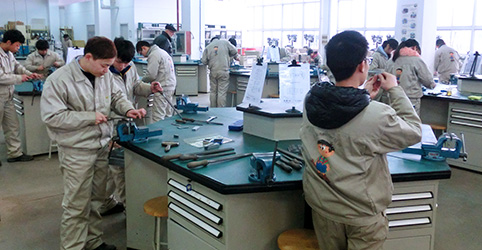
At the German-Chinese Vocational Education and Training Conference, Professor Friedrich Hubert Esser, President of the Federal Institute for Vocational Education and Training, gave a keynote address on the topic of "Implications of Economy 4.0 for training within the German VET System". [VET: Vocational Education and Training]
The "Made in China 2025" strategy provides opportunities for German providers of initial and continuing vocational training. The aim of the strategy is to establish a modern VET system in China by 2020. In a further keynote speech, Dr. Liu Lixin from the Central Institute of Vocational and Technical Education presented the challenges posed by the reforms.
Liu described demographic change and the overaging of the population as major challenges for his country, especially with regard to increasing productivity. Quality assurance is a further problem faced by the People's Republic of China. Dr. Liu explained that there was already a shortage of 4,000 teachers in the vocational education and training system. In addition to this, trainee vocational school teachers who had attended an institute of higher education were not in possession of the necessary practical experiences.
The "Made in China 2025" strategy provides opportunities for German providers of initial and continuing vocational training. The aim of the strategy is to establish a modern VET system in China by 2020. In a further keynote speech, Dr. Liu Lixin from the Central Institute of Vocational and Technical Education presented the challenges posed by the reforms.
Liu described demographic change and the overaging of the population as major challenges for his country, especially with regard to increasing productivity. Quality assurance is a further problem faced by the People's Republic of China. Dr. Liu explained that there was already a shortage of 4,000 teachers in the vocational education and training system. In addition to this, trainee vocational school teachers who had attended an institute of higher education were not in possession of the necessary practical experiences.
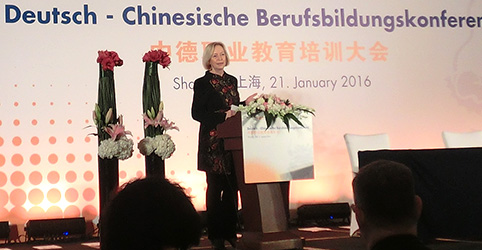
More than 250 participants from Germany and China received insights into the latest developments in vocational training in the People's Republic. The conference offered abundant time and scope for networking with German companies located in China, with Chinese vocational schools and colleges and with policy-making stakeholders.
At the at the "Vocational education and training market place", iMOVE presented the diverse range of services offered by German providers of initial and continuing vocational training. The latest iMOVE brochures on the healthcare professions and renewable energies were also available.
On the day following the conference, company visits took place to Bosch-Siemens Household Appliances and to Schäffler in Nanjing. Both companies have successfully embraced German-Chinese VET cooperation and were happy to grant an insight into their training activities.
At the at the "Vocational education and training market place", iMOVE presented the diverse range of services offered by German providers of initial and continuing vocational training. The latest iMOVE brochures on the healthcare professions and renewable energies were also available.
On the day following the conference, company visits took place to Bosch-Siemens Household Appliances and to Schäffler in Nanjing. Both companies have successfully embraced German-Chinese VET cooperation and were happy to grant an insight into their training activities.
Background
The conference took place within the scope of the VETnet Project, which is being implemented by the Association of German Chambers of Commerce and Industry (DIHK) and the German Chamber of Commerce and Industry in Shanghai.
The VETnet Project is funded by the Federal Ministry of Education and Research (BMBF). Its aim is to establish dual elements in the vocational education and training systems at eleven locations where Germany maintains Chambers of Industry and Commerce abroad – Brazil, China, Greece, India, Italy, Latvia, Portugal, Russia, Slovakia, Spain and Thailand.
The VETnet Project is funded by the Federal Ministry of Education and Research (BMBF). Its aim is to establish dual elements in the vocational education and training systems at eleven locations where Germany maintains Chambers of Industry and Commerce abroad – Brazil, China, Greece, India, Italy, Latvia, Portugal, Russia, Slovakia, Spain and Thailand.
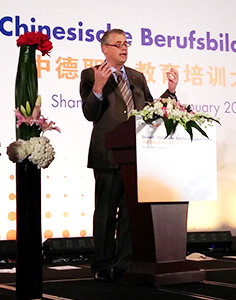
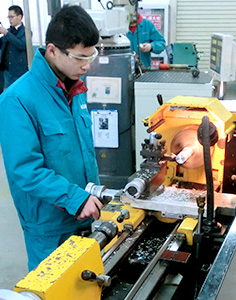
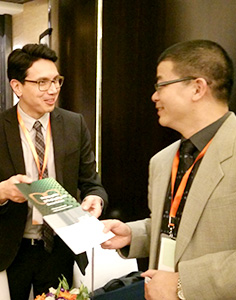
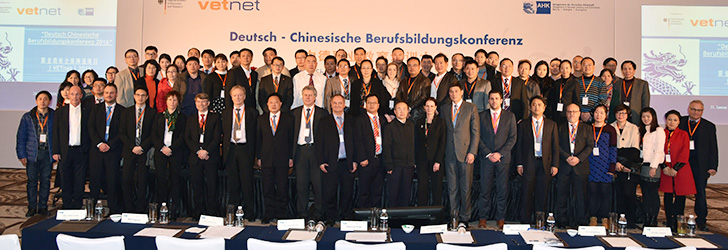
Photo credits: German Chamber of Commerce and Industry in Shanghai